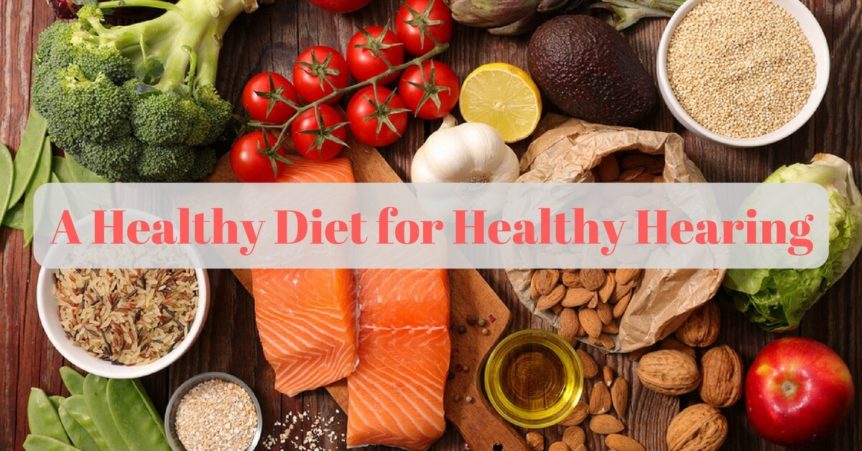If you’ve heard it once, you’ve heard it a million times: a healthy diet is central to our overall health. But, have you considered how a healthy diet contributes to healthy hearing as well?
A new body of research reveals that a healthy diet full of nutrients could support healthy hearing and even provide some resistance to age-related hearing loss. Check out the studies below and learn more about the nutrients to add to your diet to improve your hearing.
High Doses of Antioxidants May Help Prevent Hearing Loss
If you’re exposed to loud noises on a regular basis, listen up! At the University of Michigan’s Kresge Hearing Research Institute, Dr. Colleen Le Prell and Dr. Joseph Miller found that “a combination of high doses of vitamins A, C, and E, and magnesium, taken one hour before noise exposure and continued as a once-daily treatment for five days, was very effective at preventing permanent noise-induced hearing loss in guinea pigs.”
Built on existing research that links noise exposure to cell death, Dr. Le Prell found that “damage to the sensory cells can be prevented by antioxidants that prevent free radical damage by binding to free radical molecules and rendering them harmless.” Vitamins A, C, and E, and magnesium, are found in dietary supplements and many vegetables and fruits.
Dr. Le Prell will eventually extend her study to human hearing, but in the meantime, she predicts that people exposed to loud environments “would likely benefit by consuming a pill or nutritional bar before going to work or attending noisy events like NASCAR races or rock concert.” If you wake up the next morning worried about hearing damage, never fear! Dr. Le Prell says that “this micronutrient combination will even work post-noise.”
Foods rich in Vitamin A:
carrots, sweet potatoes, winter squash, cantaloupe, apricots, spinach, kale, collard greens
Foods rich in Vitamin C:
papaya, citrus fruits, strawberries, bell peppers, broccoli, Brussels sprouts, dark leafy greens (kale, mustard greens, chard)
Foods rich in Vitamin E:
sunflower seeds, almonds, Swiss chard, turnip greens, asparagus
Foods rich in magnesium:
bananas, yogurt, black beans, almonds, pumpkin seeds, spinach
Omega-3 Anti-Inflammatory Properties Could Protect Against Hearing Loss
Omega-3 fatty acids are an important of a healthy diet and can be found in foods such as salmon, tuna, and sardines. A study from The Daily Sentinel indicates that “people who eat two or more portions of fish per week are 42% less likely to develop presbycusis [age-related hearing loss] compared with those who do not eat fish on a regular basis.”
Additionally, antioxidants could be beneficial to hearing protection. According to audiologist Dr. Joe McDermott, “Reducing free radicals by consuming leafy greens such as spinach and romaine lettuce, etc. is thought to prevent damage to the inner ear.” People with a folate deficiency have been found to have a 35% higher risk for hearing loss, according to The Daily Sentinel. Dr. McDermott also points to other vitamins and minerals important to hearing protection, such as vitamin B12 and vitamin D, which contribute to improving your immune system, circulation, and bone health. Zinc has been linked to protecting older individuals from age-related hearing loss.
Foods rich in Omega-3 fatty acids:
flaxseed, chia seeds, tuna, salmon, soybeans
Foods rich in folic acid:
oranges, beans, breads, cereals, rice, leafy greens
Foods rich in vitamin B12:
meat, poultry, fish, mussels, eggs, milk
Foods rich in vitamin D:
salmon, herring, catfish, trout, oysters, milk, eggs, shiitake mushrooms
Minerals for Better Hearing
A May 2017 article from Hearing Health indicates that minerals are an essential part of a healthy diet and also contribute to boosting your hearing abilities. “Potassium is responsible for regulating the amount of fluid in your blood and body tissue. That’s important to your hearing health because fluid in the inner ear, that part of the ear that translates the noises we hear into electrical impulses the brain interprets as sound, is dependent on a rich supply of potassium,” writes Brande Plotnick. Similarly, zinc is an important mineral to your body’s immune system, promoting cell growth and healing wounds.
Foods rich in potassium:
lima beans, tomatoes, raisins, bananas, potatoes
Foods rich in zinc:
beef, pork, dark-meat chicken, cashews, peanuts, split peas, lentils, dark chocolate
Improving Your Hearing Health
Hearing loss is an invisible condition, which means we tend not to notice it until it has advanced. Scheduling an annual hearing test is a fundamental part of maintaining your hearing health. With a hearing test, you’ll be able to monitor your hearing abilities and address any issues as soon as they arise. To schedule a hearing test, Contact us at Neighborhood Hearing Aid Center today!

